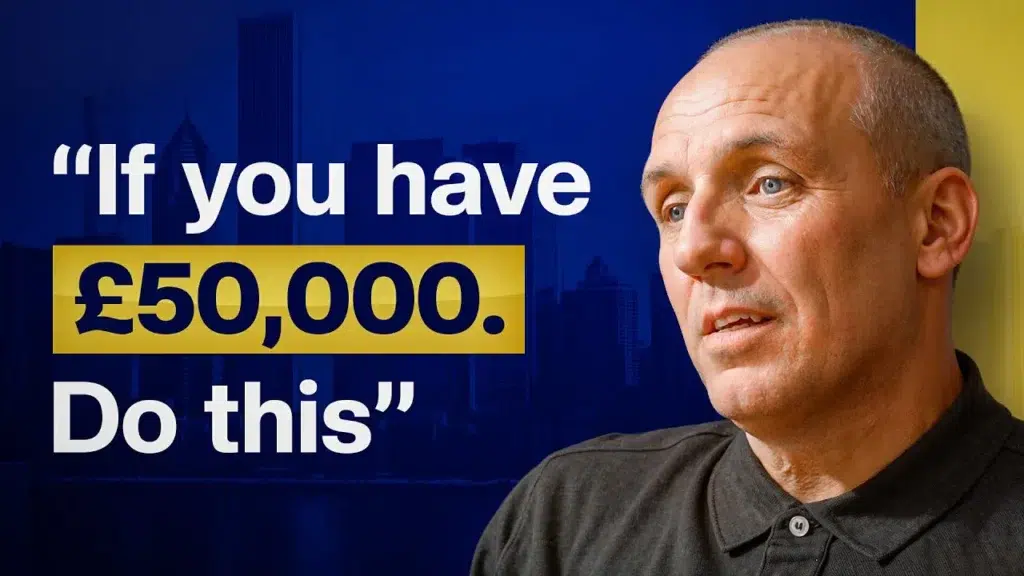Paul Carroll joined Samuel Leeds’ academy to give himself a fresh push after 23 years of being in the bed and breakfast business and is already seeing the benefits after just six months. The builder makes money from Airbnbs, which he owns, as well as converting houses into shared accommodation for asylum seekers.
For many years Paul and his wife ran a bed and breakfast in Manchester. Paul started the business by buying a six-bedroom house and taking in guests.
Then, when it flourished, he bought the property next door. For a decade the couple worked hard and paid off what they owed on the two houses.
“We had like a year really enjoying ourselves,” recalls Paul. “But next door but one came up, so I bought that. Then another house came up next door to that. So, I bought that.
“The next thing you know I've got 24 bedrooms [with] 24 en suites. We had seven staff and a chef. Then I opened a bar underneath the bed and breakfast. We had a massive reception built and were doing really well until Covid struck. Covid killed us.”
At that point Paul decided to change the B&B into serviced accommodation – in common with a lot of other landlords who rented out their properties to contractors and other key workers during the pandemic.
“The houses were intermingled with each other, but we blocked them all back up and just turned them into four Victorian houses. There’s parking. You just can't find that in Manchester, not many of them anyway and we've got four of them.”
With six bedrooms and six bathrooms in each one, there is ample scope to accommodate large numbers of guests and his business is thriving once again.
Alongside his SAs, the 52-year-old entrepreneur also has a building company, M30 Property Maintenance Ltd, which turns houses in the city into HMOs for a public service provider.
“We work with a provider called Serco. Serco will get investors, usually from Hong Kong or China, to buy the properties and then we go in and turn a three-bed into a five-bed HMO.
“I've done well over 50 of these HMO conversions. I've got four on this month (August 2024) already. I've been doing this since Covid struck,” explains Paul.
Once the work is complete, Serco then leases the property, using Government funding to house asylum seekers while their claims are being processed.
Having seen the huge demand there is for this type of accommodation, Paul’s goal now is to acquire his own portfolio of HMOs by remortgaging his property. He hopes to raise £300,000 and pay off another mortgage, leaving him with ‘£220,000 fluid.’
“When I get my money through from my remortgage, I'm going to go on a bit of a spending spree. My aim is to get 8 to 10 HMOs all with Serco.”
The builder has already bought one property at auction in Chorley, Lancashire for £85,000. He plans to refurbish it at a cost of about £25,000 and then refinance it.
“Once it's done up I'm hoping to get about £135,000 to £140,000, but it's not that that I'm in the game for. I want to do it up, remortgage it and then lease it to Serco. You get £78 per room per week.”
On a five-bedroom house, that equates to a monthly revenue of £1,560. By Paul’s calculations that would mean he could earn about £1,100 a month per property, after deducting the cost of insurance and the payment on an interest-only mortgage.
With no bills to pay and no risk of voids, the income is totally passive as it is taken off his hands for several years, he points out. And he can pull out the bulk of his money with the refinance to repeat the process.
‘We can turn around a property in six weeks’
With millions of pounds up for grabs through working with public service providers and housing associations, there are rich pickings to be had for entrepreneurs like Paul.
He is actively on the hunt for properties with the potential to be converted into HMOs and there are some bargains to be had, especially slightly further afield from Manchester.
“You can go to a place like Skelmersdale and get a house there for five bedrooms for £85,000. Some of them are done up as well. You don't need to do much apart from change the odd fire door.”
He can then rent it to a housing provider and earn ‘very good money.’
The first thing Paul does before even viewing a property is to obtain the postcode. “Say we’ve seen a property in Chorley, we ring Serco and give them the postcode. If they say yes we do that area, you can ask them what the rate is.
“Once you get past that stage, if you buy the house, you can ring them back up and they'll
arrange to come out and see you.”
Paul would describe his plans for the conversion and then a signed pre-release agreement would be issued giving him six months to get the property ready. After that it would be handed over to Serco which would rent it from him.
“The day before you give it to them you’d walk around that property and video it. They have to give you that property back in the same condition that you gave it to them. But I've never known them to give a place back. They always just keep the lease going generally.”
Another advantage is that the rent goes up broadly in line with inflation.
With a team of electricians, joiners and other traders at his disposal, Paul’s building firm can turn around a property in six weeks.
In his experience, a lot of investors from Hong Kong and China are only buying houses which require minor improvements which makes the job quick.
One house, which he took on in Warrington, near Manchester just needed new fire doors to bring it up to regulation standard and a lick of paint.
Paul searches Rightmove for opportunities and intends to go to auctions too once his remortgage has come through.
“I can start looking at houses that haven't got kitchens in, so I don't have to pay the stamp duty.”
At his height, the businessman had nine people working for him. He still employs joiners, but the rest of his team are sub-contractors, including the electricians.
Paul converted one large house in Stockport, which was bought by an investor, for five disabled boys to move into, supported by a live-in carer.
He is also looking for investors himself to partner up with as he seeks to expand his portfolio.
There are pitfalls to be aware of. Some places are designated Article 4 areas where the local council has stated that it is not allowing any more HMOs. In that case, if Paul wants to buy a property in that area and rent it out as a house share, it must have so-called grandfather rights – meaning that it is already an HMO. If five or more people live there, it also must be be licensed.
The other option is to purchase a house in somewhere like Chorley which has no Article 4 restriction.
Paul recommends the HMO strategy as an excellent way of making money but warns that it is important to find out what the rules are before buying a property because they vary, even within the same city or town.
Parts of Manchester, for example, are covered by an Article 4 direction and others are not.
“You might buy something on a road that is Article 4 and the road next to it could be full of HMOs. You’ve got be really careful and just do your due diligence.”
‘Joining the academy is the best thing I’ve done’
Paul became connected with Samuel Leeds through his daughter who talked him into coming to a £1 crash course. They attended the event in Birmingham together and then came to another one in Manchester.
After a week of thinking about it, he joined the academy. “It's the best thing I've done. I've met so many people. It's been a life changer for me, and I've only been in six months.”
On his training he was taught about creative strategies, including rent-to-rent and lease option agreements.
It was through an electrician working on one of his jobs that Paul snapped up his first lease option on a two-bedroom flat. “Every day he was moaning about this flat he’d got. He was getting £800 a month for it but his mortgage was £1,000 a month. So, he was in negative equity and said he couldn’t sell it.”
Paul saw it as a perfect opportunity. “For him it's a burden but for me I was like that sounds great.”
After viewing the apartment and looking at the neighbourhood Paul decided he could make a profit by renting it out as serviced accommodation on sites such as Airbnb.
“I'm going to pay him £1,000 a month. We'll get about £120 to £130 hopefully a night, maybe a bit less during the week, but we’ll easily make our money. You can also put a sofa bed in the living room. It's not open yet but we've done it all up. It's ready to go.”
His margin is expected to be about £1,000 a month, minus his costs including maintenance and taking into account periods when it might not be booked.
Paul has agreed a lease option to buy the apartment in five years’ time for a set price. He will pay the solicitors’ fees and £1 for the option. In the meantime, he benefits from the cashflow, which he can save for the deposit, as well as the potential capital appreciation.
Paul says it is an agreement which suits both parties because the owner of the flat will have no hassle and will be receiving a fixed rent.
“He's over the moon. He's even come and put lights in for us to help us get started because it's just a burden off his shoulders. He said it's been a nightmare, so it works out well.”
Paul has also branched out into deal sourcing, selling one deal for £5,000 after spotting a lucrative opportunity to turn a commercial property in Chorley into an HMO.
Becoming a member of the academy has rejuvenated Paul’s business and given him new ideas at a time when, as he describes it, he had ‘lost the wind in his sails.’
“I joined because I wanted to give myself more of a vision and a push. I’ve got my SAs and we were doing OK, but being on the academy showed me how to do it properly. Now it's streamlined so we do a lot better. And the networking is unbelievable. I’ve made so many contacts.”
Paul’s tips
- It’s so easy to get into property. You don’t need much money to get started.
- If you’re starting from scratch I would buy a rundown property and turn it into an HMO for the passive income. If you're buying a house up north for £70,000 you don't need that much of a deposit, and you could do it as a joint venture.
Samuel Leeds’ verdict
“Paul has done so well with his SAs, and he’s got a brilliant strategy with his HMOs. With his experience as a builder with a building company, he’s also been a massive asset to the academy helping other students and being helped by them.”






